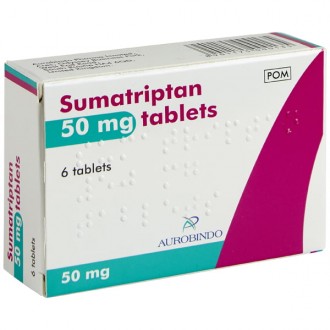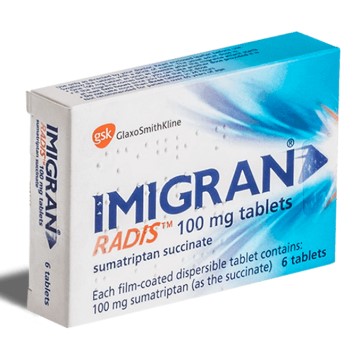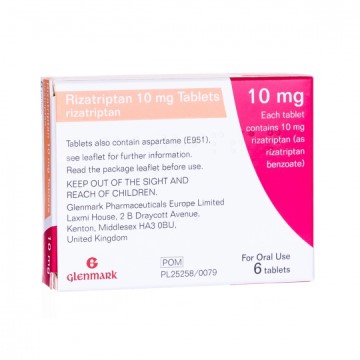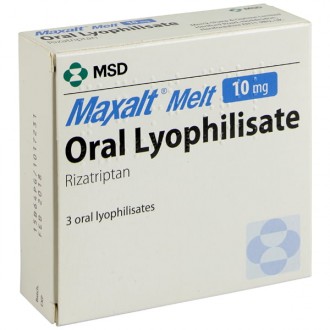Migraines can have a debilitating impact on your life, compromising your ability to work, travel and perform daily tasks. In the UK alone, 10 million people suffer from migraines, with women aged 15 to 49 most likely to experience them (Migraine Nation Report).
There are numerous causes of migraines, and understanding the triggers can reduce their frequency. However, many people need specialist treatments as over-the-counter painkillers don't combat the symptoms.
Pharmacy Online has a range of effective migraine treatments that quickly get to work, ensuring headaches don't ruin your day. Our dedicated pharmacists can help you find the right medications for your needs, and we deliver treatments straight to your door.
What are migraines?
The terms migraine and headache are often used interchangeably, but they're very different. Traditional headaches often cause painful symptoms across the temples, back of the neck, and forehead, typically lasting for a few minutes to hours.
Most people find these headaches get better with over-the-counter painkillers such as paracetamol and ibuprofen, but migraines are more severe.
Migraines cause severe pain that often appears on one side of the head. Many people compare it to a throbbing pain that can cause nausea, vomiting, sensitivity to light and auras.
There are different types of migraines, and knowing yours ensures you access suitable treatment options.
Migraine without aura
As the most common type of migraine, people with this condition often receive no warning that they're about to experience a severe headache. The pain can last four hours, but some experience it for days.
Common symptoms of a migraine without aura include:
- Pain when moving or exposed to light
- Throbbing headache - typically on one side of your head
- Feeling sick/being sick
Some people experience these migraines once in a while, but others could get them a few times a month or even more.
Migraine with aura
Migraines with aura symptoms are less common, but around 25% of people experience them (NCBI). An aura is a warning sign that can appear up to an hour before the pain sets in, with people experiencing visual disturbances, including:
- Flickering and flashing lights
- Seeing coloured lines and spots
- Zigzag patterns
- Blindness (this is only temporary and an infrequent disturbance)
Some people also feel faint, have problems speaking and experience tingling sensations. Numbness and feeling unstable in general are also signs of auras.
Vestibular migraine
Also known as migrainous vertigo, vestibular migraines affect your sense of balance and can create sensations of vertigo and dizziness. While some people experience vertigo on its own, a severe headache must accompany it to be classed as a vestibular migraine.
The symptoms vary, but dizziness and the feeling that things are moving around you are familiar with these migraines. Some people also have pain when exposed to light, instead of just being sensitive, but the overwhelming sensation of vertigo often leads them to seek specialist support.
Vertigo
Vertigo and dizziness are often confused, but the symptoms are very different. With vertigo, the world feels like it's spinning around you, but dizziness can make people feel faint and confused without the rotating sensations.
Inner ear and vestibular system problems often cause vertigo, hence the name. Dealing with migraine headaches and vertigo at the same time can be an overwhelming experience, which is why vestibular migraines have a classification in the ICHD-3 (International Classification of Headache Disorders).
Chronic migraine
Chronic migraines are very rare, impacting just 2 in 100 people. The diagnostic criteria for chronic migraine means people must have headaches for at least 15 days a month, with eight of those days being migraines.
Anything less than this is classed as episodic migraines, which are easier to manage. Naturally, people with chronic migraines have a reduced quality of life as they deal with disabling symptoms regularly, including:
- Recurrent migraine headache.
- Extreme sensitivity to light, smells and sounds.
- Nausea and vomiting.
Some might go into remission, while others can find their migraine symptoms get worse, impacting daily life.
Menstrual migraine
Migraine attacks are more common in women than men, highlighting the link between hormones and headaches. Many women experience migraines around their menstrual cycle, often when oestrogen levels begin to drop, but they usually have attacks throughout the month, too.
The links between oestrogen and migraines are widely studied, and attacks are frequent during ovulation (NCBI).
Symptoms of a menstrual migraine include:
- Blurred vision
- Throbbing headache
- Dizziness
These migraines are notoriously challenging to treat and are usually more severe than other forms of migraine. However, as hormone levels stabilise, they gradually go away.
Hemiplegic migraine
As the name suggests, hemiplegic migraines cause temporary paralysis along one side of the body. Naturally, these migraines are terrifying as the weakness typically occurs, mimicking the symptoms of a stroke.
The symptoms of these migraines include:
- Ringing in the ears or hearing issues
- Speech difficulties
- Weakness and paralysis on one side of the body
- Problems completing tasks that require coordination
- Vertigo
In many cases, hemiplegic migraines run in families, also known as Familial Hemiplegic Migraine, but Sporadic Hemiplegic Migraines occur with no known genetic link.
What causes migraines?
With so many types of migraines, it's hard to pinpoint one specific cause. However, they can be due to genetic factors, hormonal changes, overactive nerves and inflammatory responses. While we can't reveal concrete migraine cases, there are specific triggers associated with them.
Stress
Stress is a common part of daily life but can also cause physiological responses. The fight or flight response can elevate your heart rate and blood pressure, while cortisol can influence the blood vessels, initiating a migraine.
Caffeine
Some people find consuming too much caffeine can cause a migraine, while others experience withdrawal symptoms if they regularly use it. As the levels drop, the brain's response causes a headache, letting you know it needs caffeine.
Some people can use caffeine tablets when a migraine occurs, but it's a short-term measure and not a viable treatment option for the long term.
Preservatives and chemicals in foods
Certain foods and drinks have additives that might cause migraines. Nitrates are often found in hot dogs, lunch meats, and pepperoni, while alcohol, aged cheese, and fermented foods contribute to migraines.
By cutting these foods out or reducing your consumption, it's possible to reduce the frequency of migraine symptoms.
Hormonal changes
Our hormones are complex things, and women experience migraines more because of oestrogen fluctuations. While menstrual cycles are the common culprits, using birth control or hormone replacement therapy (HRT) can also create changes in oestrogen levels.
For this reason, many women over 50 find their migraines reduced, as they don't experience the same hormonal changes.
Medication overuse headache
In some cases, people experience medication overuse headaches, which usually occur due to taking too many triptans, opiates and other treatments for chronic migraines. High painkiller usage means the body becomes accustomed to them and begins withdrawal symptoms.
Simply put, overuse of medicines means the pain-relieving treatments won't be as effective during an actual migraine attack, and your body can simulate the symptoms during withdrawals.
Monitoring your usage and seeking specialist support can help you explore other treatments.
Photophobia
Also known as light sensitivity, people with this condition often find certain stimuli result in abnormal brain activity. Bright lights, sunlight or other triggers can induce migraine symptoms or make them worse, resulting in ongoing discomfort.
There's no known cause for photophobia, but wearing sunglasses and using screen filters can prevent migraines.
The symptoms of a migraine
Each migraine sub-type has distinct symptoms, but there are four stages of each attack that might cause other symptoms. Understanding them can help you assess the type of migraine you're experiencing.
Prodrome Symptoms:
- Stiff muscles
- Frequent urination
- Problems reading and speaking
- Lack of concentration
- Feeling depressed or irritable
- Insomnia, while still yawning
- Being sensitive to sound and light
- Nausea or vomiting
- Craving certain foods
Aura Symptoms:
- Weakness along one side of the body
- Sight problems - temporary blindness, witnessing flashing lights or shapes
- Tingling or numbness
- Problems speaking
Migraine Headache Symptoms:
- Insomnia
- Anxiety and dizziness
- Feeling sick and vomiting
- Neck stiffness
- Mood changes
- Stuffed nose
Postdrome Symptoms:
- Concentration issues
- Low or high mood - depending on symptoms
- Feeling tired
As you move through the various phases of migraine attacks, you'll notice some or all of these symptoms.
Diagnosing migraines
Migraines can be challenging to diagnose, as they're often confused with regular headaches. However, once you see a doctor, they can go through your symptoms and make a diagnosis. There are numerous ways to do this, but your doctor will evaluate whether you meet the criteria.
Migraine without aura diagnostic criteria:
- Migraine attacks occur on one side of your head
- Frequent migraines last four to 72 hours, occurring at least five times
Migraine with aura diagnostic criteria:
- Visual disturbances
- Frequent headaches with severe pain
- Sensory issues
You should also have either a sensitivity to light, nausea, vomiting, or sound sensitivities.
Migraine diaries
When you first visit your GP, they might ask you to keep a diary of your migraines, which aids in the diagnostic process. The journals can also rule out a general headache disorder or help your doctor explore other potential causes.
Your diary should include:
- Whether there are any triggers, including bright lights, exercising, etc
- Whether you had problems sleeping before the migraine or after
- When your migraines occur, including the day and time when you first began experiencing the symptoms and when they finally subsided
- Any symptoms you experienced, including feeling sick, dizzy or pins and needles, before, during and after the migraine
- Where the pain occurred, including around the eyes, back of the head, neck or which side
- How you treated the migraine, including which medications worked
Health tests
Some conditions masquerade as migraines, and your doctor will order tests if they want to be sure. CT scans, MRIs and EEGs can confirm the following conditions:
- Brain tumours: Both benign and malignant tumours can cause various symptoms and be potentially fatal. The pain associated with brain tumours increases over time, and people often seek urgent medical attention.
- Temporal Arteritis: When the arteries in the temples become inflamed, they can cause severe pain and visual problems.
- Trigeminal Neuralgia: The condition causes problems with the trigeminal nerve, which results in extreme facial pain.
- Epilepsy: The symptoms of migraines and epilepsy can overlap - especially if you experience auras. However, your doctor will order an EEG to rule out epilepsy.
Preventative migraine treatment
There are two types of migraine treatments: preventative and abortive. While there's no cure for migraines, preventative treatment can reduce the frequency and help you combat the initial symptoms during the prodrome stage.
Both medications and lifestyle changes can be beneficial as preventative measures.
Lifestyle changes
Once you understand your migraines more, it's easier to learn the triggers. Some people find that making minor alterations can significantly affect their symptoms. Preventative measures include:
- Keeping a diary: If certain foods, drinks, or activities trigger your migraines, you can cut them out to reduce attacks.
- Monitor your sleep: Getting the recommended amount of sleep each night can refresh your brain and prevent migraines.
- Maintain a healthy diet: Try to moderate your consumption of fatty and sugary foods and alcohol. Getting your five a day and drinking plenty of water is central to health and wellbeing.
- Control stress: Yoga, Pilates and meditation can decrease stress and prevent headaches.
- Electrical devices: A transcutaneous supraorbital nerve stimulation device can stimulate the nerves responsible for migraines, reducing pain.
Preventative medicines
Some medications can decrease your attacks and even stop them from occurring. Your doctor will evaluate your symptoms to determine whether the following treatments could benefit your type of migraine.
Hormonal treatments
The contraceptive pill or patch can reduce the frequency of hormonal migraines in women. Your doctor might also prescribe HRT, but it's important to remember that the combined pill can increase headaches.
Angiotensin II blockers
As hypertension medicines, Angiotensin II blockers, especially candesartan, which is known to block migraines, can be beneficial in preventing migraines. Beta-blockers are also popular treatment options, used primarily for people with low blood pressure.
Anti-convulsant medicines
While anti-convulsant medications are primarily for epilepsy, they can also reduce migraines. Both sodium valproate and topiramate can be effective, but valproate can be harmful to unborn babies, so women who are pregnant or planning to have a baby shouldn't take it.
CGRP MABs
CGRP MABs offer a lot of promise as medicines for the prevention of migraines. They're relatively new but moderate CGPR hormone activity, which plays a significant role in migraine pain. Regular doses can prevent a migraine from developing.
Botox
While commonly associated with cosmetic treatments, Botox can be beneficial for chronic migraine sufferers. Its ability to block neurotransmitters means you'll feel less pain when a migraine attack occurs.
Antidepressants
Both SSRIs (selective serotonin reuptake inhibitors), SNRIs (serotonin noradrenaline reuptake inhibitors), and Tricyclic antidepressants are sometimes used off-label for migraine prevention.
However, these medications are strong and can have side effects, so speaking to your doctor before taking them is essential.
Abortive migraine treatments
There are also migraine relief treatments available, which you can take when you first begin experiencing pain. While over-the-counter painkillers can have benefits, many people find they're not strong enough to treat migraines.
Triptans
Often considered the best migraine treatment, triptans are most beneficial when your symptoms begin. They reduce migraines by narrowing your blood vessels, preventing pain and inflammation. Some triptans work better in certain situations:
Rapid-progression: Migraines that appear quickly are most treatable with Sumatriptan tablets and Rizatriptan, which work rapidly.
Long-term migraines: If your migraines last longer than average, Frovatriptan and Naratriptan. Zolmitriptan is often best for menstrual migraines.
Convenience: Imigran Nasal Spray and Maxalt Melt are more convenient if you're not a fan of taking tablets.
Anti-sickness medicine
If you have nausea and sickness with migraines, there are medicines available to reduce the symptoms. While these treatments won't help with the headache phase, they can help you navigate migraines effectively when used in conjunction with pain relievers.
Available options include Prochlorperazine tablets and Metoclopramide, which work quickly to relieve sickness.
Opioids and Naproxen
If you can't take triptans, your doctor might prescribe opioids for migraines. Codeine is a popular option, but it's essential to remember that medicines in the opioid category are highly addictive and should always be used in moderation.
Naproxen is a powerful anti-inflammatory, but prolonged usage can cause gastric issues and ulcers.
Buy migraine medication from Pharmacy Online
Migraines can wreak havoc on your life, but effective treatment can reduce the symptoms and stop them from getting in your way. Pharmacy Online offers a range of migraine treatment options that provide quick relief.
From tablets to nasal sprays and anti-sickness medicines, our extensive range of migraine treatments is available online, giving you unparalleled convenience.
Complete a short online assessment
Before issuing medication, we ask our customers to complete a short online assessment. Some medicines aren't suitable for people with kidney disease, epilepsy or other health conditions, and our main priority is your safety.
When you complete your assessment, you'll see all suitable medications. Just make your choice, head to the checkout and finish your order. We ship your medicine in discreet packaging straight to your doorstep.











